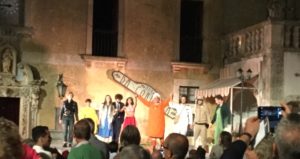
The beauty of Martina Franca is probably best witnessed in the early morning, when the streets are deserted and the white stone buildings are bathed in the cool morning sun. At 6 a.m. there are very few people around, and the exquisite architecture of the town can be truly appreciated. The Basilica di San Martina, which will host Rossini’s “Messe” in a “Concerto per lo Spirito,” sits majestically at the top end of the Piazza Plebiscito, with its baroque façade apparent in all its glory. Although the town becomes fairly busy during the day, it never loses its intimate informality, and visitors are free to wander more or less where they please; I was able to enter the courtyard of the Palazzo Ducale, and have a good look at the stage, the set and the seating area, without anyone taking the slightest notice.
The afternoons can be hot, so it is a good time to seek some shade, which I did by interviewing the conductor, Sesto Quatrini, in a local café. Maestro Quatrini, who is conducting Vaccaj’s largely unknown opera “Giulietta e Romeo,” is very much a man on the move. Having made his Italian opera debut only last year, he is quickly establishing himself as a regular in Italian opera houses. His next engagement will be at Venice’s, La Fenice for a production of “La Traviata.” The evening’s opera was Alessandro Scarlatti’s “Il trionfo dell’onore,” held outside in a courtyard of the Masseria Palesi, a rambling baroque complex, ten minutes from the centre. It was an imaginative presentation with some excellent individual performances, in an ideal venue. With a starting time of 9 p.m., it did however, make for a long day!
An early start again tomorrow: I will be interviewing Raffaella Lupinacci, who plays Romeo in Vaccaj’s opera, and reviewing Handel’s “Rinaldo” in the evening, and if I have time there is also a Picasso exhibition I might catch.
Categories
Special Features

